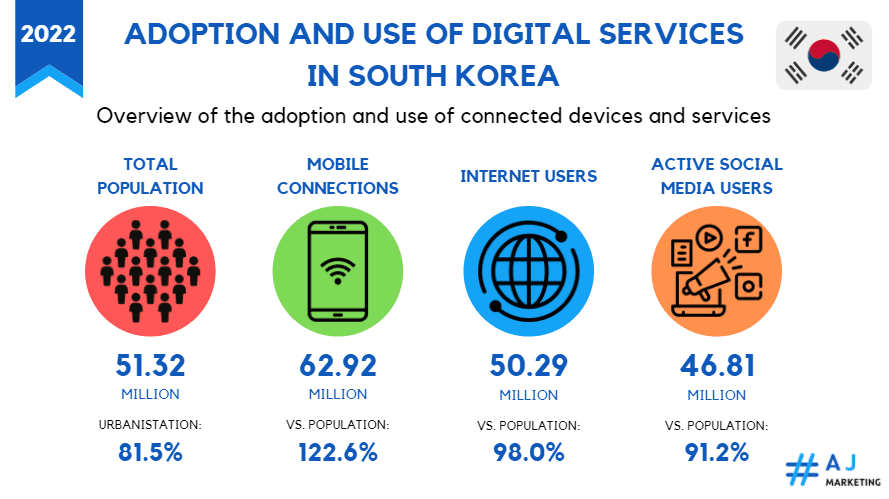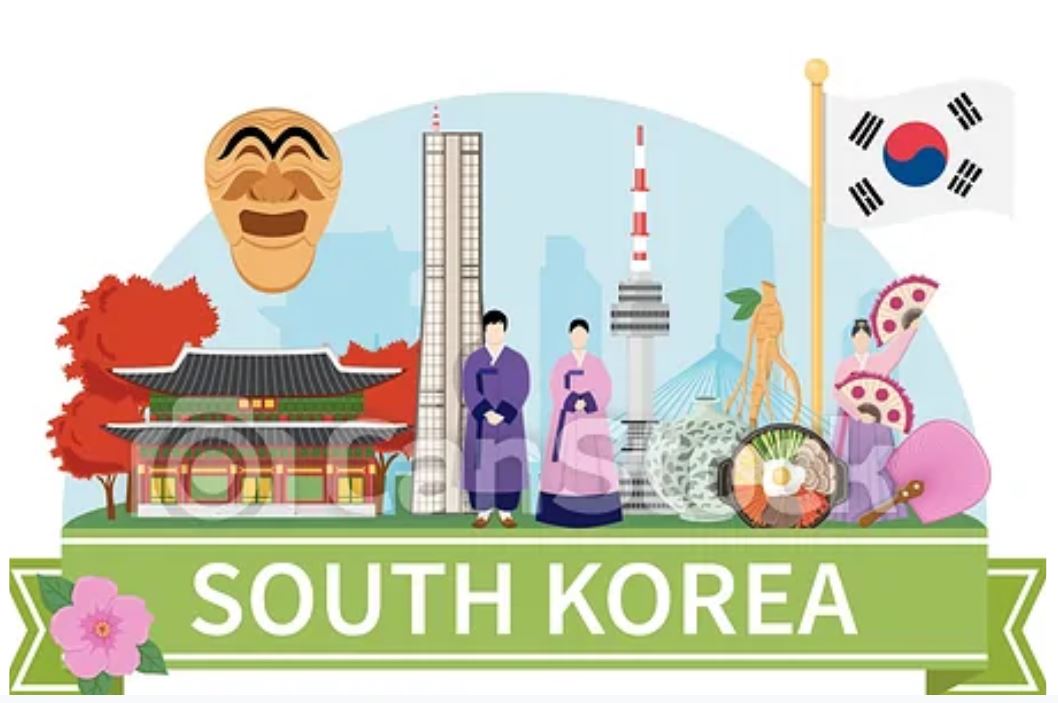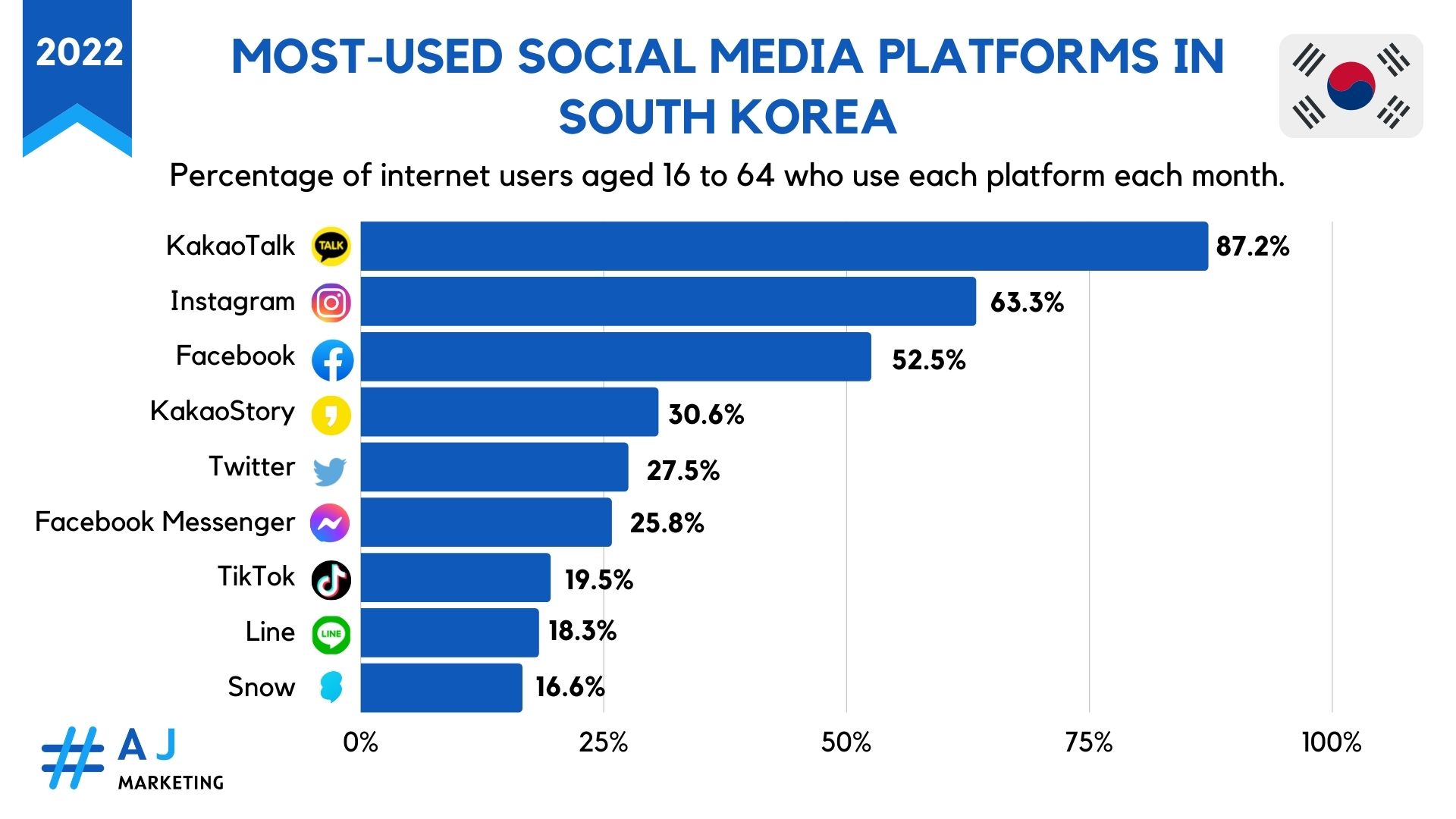Wanna know how to market and advertise your business in South Korea? You came to the right place.
South Korea is known for its advanced technology, fast internet, and highly-developed mobile infrastructures. Its population can be described as average in number, but it remains to be one of the most lucrative markets in the world because of its consumer culture and adaptation of everything digital.
The number of mobile connections in South Korea exceeds the actual number of people. There are 122.6% mobile connections in this country compared to the 51 million population. A whopping 98% of the population also use the internet, and 91.2% use social media. Through this data alone, you’d realize how important the internet is for business marketing and advertising.

You may think that entering the South Korean market will be a piece of cake because you can do everything digitally. Don’t be fooled! For a new business to succeed in this market, you’d need more information than their digital behavior. You’d need in-depth research and insider information from the locals.
Lucky for you, we have made this complicated task a tad bit easier. In this article, we have compiled the best tips for marketing and advertising in South Korea from AJ Marketing, the leading marketing agency in APAC. Let’s take a look!
7 Strategies for Marketing in South Korea
- Put yourself in their shoes: Know the Korean market, their culture, behavior, likes, and dislikes.
- Keep your enemies close: Know and research about your competitors in the Korean market.
- Follow the clicks: Know the most-used platforms of South Koreans and start from there
- Be like water: Water always follows the shape of its container, and so should your campaigns!
- Idols make your brand (K) pop: Working with K-pop idols and celebrities will give your brand a resounding entrance.
- Use the power of influence: Collaborate with influential people and key opinion leaders to establish brand trust.
- Find a local partner: Launching your campaign will be easier and more effective once you secure the help of a local marketing agency.
1. Put yourself in their shoes: Know the Korean market, their culture, behavior, likes, and dislikes.

Have you ever imagined going to an unfamiliar place without even checking a map? You’d have a 50-50 chance of arriving at your destination safely and without detours. The same goes for marketing your business. You must first research the South Koreans’ culture, trends, likes and dislikes before launching your first campaign.
South Korea has a rich culture dating back to more than 4,000 years ago. Their cultural heritage has continued to affect their lives, behaviors, and perspectives up until today. So, for a new business like yours entering this country, it would be best to research on their culture and history before devising your campaign.
The South Korean market has unique behaviors which may seem surprising to you. For example, South Koreans love free samples, and ticket prices for events are usually low. They are also frugal with their money, and they value brand names that can elevate their social status. Lastly, “saving face” is something deeply ingrained in their culture, and mockery does not usually make the cut.
These are only a few examples of how different and unique their culture is. The strategies that are effective in the Western culture are not necessarily effective in this market. Thus, you must do your homework and try to put yourself in their shoes.
2. Keep your enemies close: Know and research about your competitors in the Korean market.

As the saying goes, “keep your friends close, but your enemies closer.”
South Korea believes in economic freedom, making it the 19th freest economy in 2022. Overall, South Korea houses approximately 4.2 million registered establishments. This enormous amount of competitors makes entering the market a big challenge.
In South Korea, there are many already-established brands who already have their customer bases. Especially in the beauty industry, local Korean skincare is more widely celebrated than American or European brands. Companies like Benefit and Sephora met obstacles when they expanded in this country.
Thus, a business entering this competitive atmosphere must do extensive research on the competing brands. Businesses should pay attention to the competitors’ campaigns, products, and marketing strategies. Doing this is a must if you want to set your brand apart from the others. Skipping this step will either make your brand forgettable, or make your launch a failure.
3. Follow the clicks: Know the most-used platforms of South Koreans and start from there

If you want to save time and money in gaining attention and conversions, you must listen to the clicks, taps and swipes. This means you must know where the people are and you must start your campaign from there. No matter how big your budget is, if the campaign is launched on the wrong platform, then it would have little to no impact.
For South Korean internet users, they mostly use the apps KakaoTalk, Instagram, Facebook, Twitter, and TikTok. They also averagely spend 1 hour and 13 minutes a day on social media. Knowing this information can help you in planning the form, duration, venue, and content of your campaign.

For example, KakaoTalk is a multimedia messaging service. This app offers free calls, event scheduling, and in-app gift shopping. Businesses use this service for marketing through the form of message ads, banner ads, business channels, and the KakaoTalk BizBoard. Meanwhile Facebook, Instagram, TikTok, and Twitter ads can be in the form of photos, videos, user-generated content, or commercials.
So, following the clicks does not only mean knowing the most-used platform. It also means knowing the best form of ads that the platform houses. It means knowing which demographics use this platform, and what they usually do when they open the site. Lastly, following the clicks is also important in estimating your campaign budget.
4. Be like water: Water always follows the shape of its container, and so should your campaigns!

Water, wherever you pour it, follows the shape of its container. This goes the same for your marketing strategies. The South Korean market’s behavior changes from time to time. Thus, your campaign must be adaptive and must be able to prosper throughout these shifts in behaviors.
For example, South Koreans purchase products not only on the basis of necessity but also for image and status reasons. Even if this is one of their purchase drivers, South Koreans still pay attention to their budget. South Koreans are also not fond of brand loyalty. They purchase more based on what is trendy than what is tested. Lastly, there was a time when local products were preferred. Today, however, the preference for foreign products is growing.
Based on the mentioned examples, you may observe that South Koreans tend to change their consumption habits. This is a challenge for marketers. Businesses like yours must find ways to keep their campaigns up-to-date even with the never-ending changes. You must be adaptive, intuitive, and flexible in order to survive in this market.
5. Idols make your brand (K) pop: Working with K-pop idols and celebrities will give your brand a resounding entrance.

It is an established practice in South Korea for new brands to work with celebrities. South Korea leads the world in celebrity pitching, with more than 40% of television ads featuring a celebrity. In South Korea, the very strong “idol culture” has led to the effective strategy of collaborating with idols and celebrities for brand promotion.
When celebrities endorse a product or service, they are extending their credibility and reputation to the latter. In South Korea, celebrity and idol advertisements are taken seriously by fans. They strive to imitate the lives of their idols–they want to look like them, eat like them, and live like them. Their admiration of the celebrities are converted into a strong form of persuasion about a certain product.
One example of this fan behavior is Innisfree’s campaign. Innisfree collaborated with the group Wanna One in selling their color clay masks. They ran a promotional event where customers may get free signed posters and polaroid pictures from the group if they buy the color clay mask set and post on their Instagram. This brought massive publicity and sales for Innisfree.
Most likely, this technique will continue to thrive in the South Korean market due to the population’s immense favor over pop and idol culture.
6. Use the power of influence: Collaborate with influential people and key opinion leaders to establish brand trust.

Strategy #5 already explained the prevalence of idol culture in South Korea. This culture is not only applicable to mega-influencers like celebrities and idols. This behavior also applies to influencers and micro-influencers in social media.
Influencers are trusted by their followers, and their opinions about issues, products, or services are given immense weight. Influencers have also fostered authentic relationships with their followers, even more real than the celebrity-fan dynamic. The authenticity, trust, and loyalty that influencers possess prove beneficial for new brands entering the South Korean market.
According to research by Rakuten Insight, 40% of South Koreans purchase a product or service based on influencer opinion and endorsement. More than half of the respondents with this experience answered that they were convinced by the promotion from the influencer. Of course, not all influencer campaigns will thrive. An influencer marketing campaign needs to be well-thought of and well-researched.
South Korea houses influencers from various niches–fitness, tech, beauty, fashion, and many others. They also exist within different platforms like Instagram, Facebook, YouTube, and TikTok. Their number may seem intimidating, and businesses may make the mistake of choosing the wrong influencer.
Before you choose the influencer to represent your brand, you must consider their values, imagery, and niche. In order to do this, you must seek the help of local people or local agencies who already know them by heart. This brings us to the final strategy, finding a local partner agency.
7. Find a local partner: Launching your campaign will be easier and more effective once you secure the help of a local marketing agency.

All the previous strategies will be near impossible to implement without the help of a local marketing agency. South Korea has a different language and culture which a new business can only overcome by partnering with someone already on-the-ground. This makes your campaign planning more efficient, ensuring that no time, money, or effort is wasted.
With this, AJ Marketing believes that they can help you truly speak to the South Korean market. With a local office in South Korea, the company is able to directly observe and understand the country’s consumer behaviors and market trends. AJ Marketing also has direct access with over 7,000 influencers from the gaming, technology, fashion and beauty industry. Lastly, AJ Marketing believes in assessing a brand’s values, identity, and image before selecting the right influencer to represent your business.
If you are looking to expand your business in South Korea, check the AJ marketing blog for information about local South Korea market trends.
Conclusion
South Korea is an ideal country for business expansion. Its ever-developing economy and use of technology makes it a lucrative place for businesses to enter the market. However, marketing in Korea may pose challenges such as differences in culture, unfamiliar historical values, and unique behavioral trends. To overcome these, a new business must partner with a local marketing agency to ensure that you are launching your campaign on the right platform, with the right strategy.
We hope these insider tips from the founders of AJ Marketing helped you plan on your next steps in marketing and advertising. We hope these will help you to generate a solid marketing strategy in South Korea for your successful brand expansion.
Disclaimer: This article contains sponsored marketing content. It is intended for promotional purposes and should not be considered as an endorsement or recommendation by our website. Readers are encouraged to conduct their own research and exercise their own judgment before making any decisions based on the information provided in this article.


































